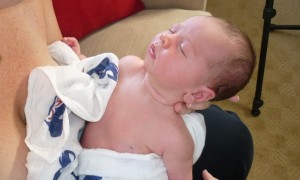Feed, Play, Sleep – No!
Why many health professionals have got it wrong
A commonly recommended pattern of caring for baby is “Feed, play, sleep”. This may be quite appropriate for babies over 3 months of age however for young babies I advise adapting it to “Feed, play, comfort, sleep”. This is because young babies’ neurological and digestive systems are immature and they often need a nappy change and the opportunity to feed before being ready to settle and sleep.
Disregarding the firmly entrenched advice to put baby to bed while still awake may raise the eyebrows of the sleep consultants, however Dr Pam Douglas author of “The Discontented Little Baby” agrees – “feed-play-sleep cycles mess with your baby’s sleep biology”. Many health professionals now recognise there are potential hazards for baby’s physical and mental development associated with rigid feeding routines and sleep training. Cue-based responsive parenting enhances baby’s wellbeing and parents’ confidence in caring for and understanding their baby’s changing needs.
Humans have also evolved over many thousands of years and in spite of very recent technological developments the biological foundations of conception, birth and nurture of babies are still exquisitely embedded in human instincts. Our babies are “hardwired” to be close to their mothers and to demonstrate their needs with non-verbal signals which attentive parents recognise and respond to accordingly. Parents are swimming against the tide of human DNA when they try to manipulate their baby’s natural instinctive behaviours to fit the western world’s demands about feeding and sleep. Yes, we live in a modern sophisticated environment, but a human’s biological functioning is the same as it was a hundred years ago, or a thousand years ago, or more.
Expectations regarding baby’s sleep can be the source of great anxiety for parents if they believe their baby is not sleeping ’well’ or ‘enough’. Understanding how variable baby’s sleep patterns are from baby to baby, and from week to week according to individual feeding, growth and developmental stages can relieve parents’ concerns, and free them to ‘go with the flow’ of their baby’s individual needs.
So what are parents to do if “feed-play-sleep” is thrown out the window? I emphasise the importance of responding to baby’s early feeding cues for best results, and my message about tired signs is similar. Respond to baby’s early tired signs by preparing baby for comfort and sleep as soon as they appear, rather than later when baby has become overtired. If baby does not settle when you expect him to, it is likely he actually needs to be fed some more. Don’t ignore feeding cues when your plan is to settle baby to sleep. The need to feed will over-rule your best efforts to settle him. If in doubt, offer another feed. This will save you time and energy in the long run, and will not “spoil” or over feed baby. Young babies under 3 months old need feeds in multiple instalments. They often need “topping up” after a bowel movement and clean up to feel full again and ready to sleep. Follow baby’s cues and the bliss of dreamland will soon be yours. (Adapted from “New Baby 101 – A Midwife’s Guide for New Parents” by Lois Wattis. Available from www.newbaby101.com.au)


